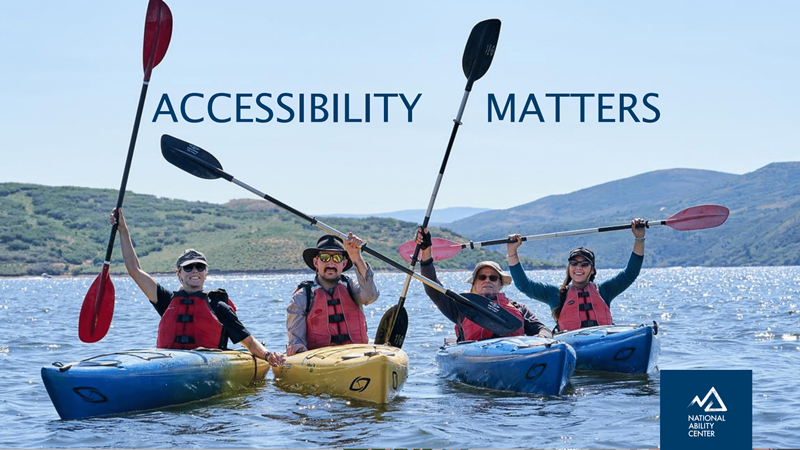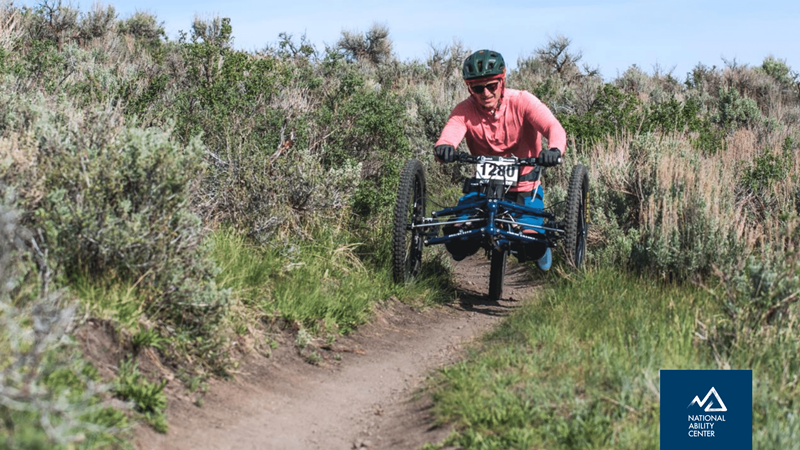By: The National Ability Center
While growth and education around adaptive recreation has steadily increased over the years, it is still not as widely adopted as it could be and many people with disabilities are left behind when it comes to physical exercise and sports. Understanding the importance of an “I Can” mindset and overarching adaptive and DEIB strategies are key in helping the outdoor industry continue to evolve to make outdoor activities available to everyone across the globe.

1 in 4 individuals in the U.S. live with a disability
One in four individuals in the United States has a disability and many more people will experience disabilities through the course of their lives because it is one demographic that someone can join at any time in their life. There are various types of disabilities to be aware of because they do not all look the same. The six types of disabilities measured are mobility, cognition, hearing, vision, independent living, and self-care. Those with developmental, cognitive and physical disabilities make up a large part of the population which is why it is critical to ensure they can be active and reap the benefits of accessible outdoor adventures, recreation and elite athletics.
There are many benefits of outdoor recreation
It’s widely understood that exercise and staying active can enhance your overall health and wellness – it’s not only good for your body, but your mind and soul as well. Some benefits include confidence, self-esteem, community, and stress relief. There is a high percentage of people with disabilities that report they are unable to exercise or enjoy sports due to proximity to a facility that offers adaptive programs, financial burden, lack of proper equipment and the list continues. The National Ability Center aims to provide programs, often free through scholarships or financial assistance, that will bring people of all abilities together for adaptive sports and outdoor adventures and as a result they sharpen their skills, build confidence, create lasting memories, boost self-esteem, cultivate long-lasting friendships, and turn their mindset from “I can’t” to “I can.”
Partnerships can help you Welcome people of all abilities
Because people live with a wide array of different abilities, it can, at first, seem overwhelming to address accessibility for all abilities in your outdoor business. But, by partnering with an adaptive expert like the National Ability Center, companies can often make small or large adaptations that ensure their programs and experiences can be accessible to a wider range of individuals. A good rule of thumb is to include the targeted population in your process. And, remember, accessible doesn’t always mean paved or “easy.” By consulting with adaptive recreation experts alongside individuals with disabilities, outdoor providers can ensure that any adaptations offer solid solutions and address an actual need.

Examples of adaptive outdoor partnerships
To build accessibility into your business, learn from projects that have already been completed and consult with experts in the adaptive field. From trail building to education and training, the National Ability Center has partnered with an array of businesses to ensure expanded accessibility. Here are two examples of how it can work:
-
Adaptive Trail Building: Working with the city and the local trail organization, Mountain Trails Foundation, the National Ability Center consulted on building an adaptive loop as part of Park City’s popular Round Valley trail network. This loop makes use of a double track dirt road and transitions into a flowing single track wide enough to accommodate three wheels. As the trail was built, corner radiuses, trail camber, accessible parking and “squeeze points” - one narrower point in the trail - often at a feature or gate which makes the whole trail inaccessible were evaluated by the team. By bringing adaptive guides and riders into the process, the result was a public trail that was fun for not only three-wheeled handcycles, but also for families, kids and the general public.
-
Training & Education: Many resorts offer adaptive skiing for both stand-up and sit-down skiers. But, in order to provide a safe and welcoming environment, resort staff needed to be able to facilitate loading or evac of chairlifts including for those using adaptive equipment like a sit ski. The National Ability Center provides yearly training and education to lift operations and ski patrol in how to work safely with this equipment and population allowing the resort to provide exceptional experiences to an adaptive population.
All outdoor businesses should have an inclusion policy
Millions of people with disabilities visit national parks annually but only two in five parks and recreation agencies have a formal inclusion policy. Inclusion is crucial for national parks and outdoor areas not only for people who have a disability but also for the community at large. National parks, partners, concessioners, and gateway communities are losing a substantial amount of revenue and notoriety because of their lack of access for individuals with disabilities. With the right partnerships, government support and education, outdoor spaces and adventure programs can revolutionize what it means to be fully inclusive.
About the National Ability Center
The National Ability Center is a 35 year-old nonprofit that provides world-class adaptive recreation and outdoor adventures for individuals and families with disabilities, physical, cognitive, and developmental, including competitive athletes, youth, veterans, and more, breaking barriers on what is possible in the world of accessibility and inclusivity remains a core pillar of their mission.